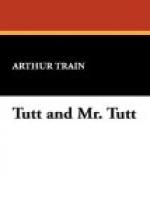But Tutt did not run. In legal phrase he stopped, looked and listened, experiencing a curious feeling of expansion. This enchanting creature transmuted the dingy office lined with its rows of calfskin bindings into a golden grot in which he stood spellbound by the low murmur of her voice. A sense of infinite leisure emanated from her—a subtle denial of the ordinary responsibilities—very relaxing and delightful to Tutt. But what twitched his very heartstrings was the dimple that came and went with that pathetic little twisted smile of hers.
“I came to you,” said Mrs. Allison, “because I knew you were both kind and clever.”
Tutt smiled sweetly.
“Kind, perhaps—not clever!” he beamed.
“Why, everyone says you are one of the cleverest lawyers in New York,” she protested. Then, raising her innocent China-blue eyes to his she murmured, “And I so need kindness!”
Tutt’s breast swelled with an emotion which he was forced to admit was not altogether avuncular—that curious sentimental mixture that middle-aged men feel of paternal pity, Platonic tenderness and protectiveness, together with all those other euphemistic synonyms, that make them eager to assist the weak and fragile, to try to educate and elevate, and particularly to find out just how weak, fragile, uneducated and unelevated a helpless lady may be. But in spite of his half century of experience Tutt’s knowledge of these things was purely vicarious. He could have told another man when to run, but he didn’t know when to run himself. He could have saved another, himself he could not save—at any rate from Mrs. Allison.
He had never seen anyone like her. He pulled his chair a little nearer. She was so slender, so supple, so—what was it?—svelte! And she had an air of childish dignity that appealed to him tremendously. There was nothing, he assured himself, of the vamp about her at all.
“I only want to get my rights,” she said, tremulously. “I’m nearly out of my mind. I don’t know what to do or where to turn!”
“Is there”—he forced himself to utter the word with difficulty—“a—a man involved?”
She flushed and bowed her head sadly, and instantly a poignant rage possessed him.
“A man I trusted absolutely,” she replied in a low voice.
“His name?”
“Winthrop Oaklander.”
Tutt gasped audibly, for the name was that of one of Manhattan’s most distinguished families, the founder of which had swapped glass beads and red-flannel shirts with the aborigines for what was now the most precious water frontage in the world—and moreover, Mrs. Allison informed Tutt, he was a clergyman.
“I don’t wonder you’re surprised!” agreed Mrs. Allison.
“Why—I—I’m—not surprised at all!” prevaricated Tutt, at the same time groping for his silk handkerchief. “You don’t mean to say you’ve got a case against this man Oaklander!”




